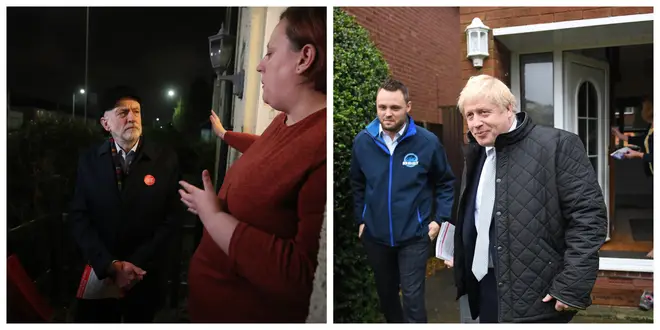
Ali Miraj 12pm - 3pm
2 December 2019, 11:54 | Updated: 2 December 2019, 12:12

Almost 200 Commons seats have not changed their party allegiance since the Second World War, a study has found.
Nearly 14 million voters are in seats that have not changed hands since 1945, with the average seat in the UK having been won by the same political party for 42 years, analysis by the Electoral Reform Society shows.
It also found that ten per cent of the 650 seats in the Commons - 54 Conservative and 11 Labour - have not swapped colour since 1918, with some having not changed since the 19th century.
Only 70 seats swapped hands at the last General Election.
YouGov's MRP projection predicts 58 seats will change hands in the upcoming vote on December 12.
The results of the YouGov #GE2019 MRP model are finally here:
— YouGov (@YouGov) November 27, 2019
Con – 359 seats / 43% vote share
Lab – 211 / 32%
SNP – 43 / 3%
LD – 13 / 14%
Plaid – 4 / <1%
Green – 1 / 3%
Brexit Party – 0 / 3%
Conservative majority of 68https://t.co/uvnl8LNj7f pic.twitter.com/Iul6HDtaP3
The Electoral Reform Society's research shows across the last three General Elections, an average of 99 seats changed hands each time, representing 15 per cent of seats switching colour.
But 192 constituencies have not changed hands since 1945 or earlier, affecting 13.7 million potential voters in the upcoming election if the trend continues.
Former prime minister Theresa May and ex-transport secretary Chris Grayling's seats in Maidenhead and Epsom and Ewell respectively have been held by the Tories since 1874.
Constituencies in the Labour heartlands of the north-east of England and the Conservative "safe seats" of the south-east were found to be the least likely to change hands, with the average transitions 63 and 76 years respectively.
The average number of years since Liberal Democrat seats changed hands was much lower at eight years.
Dr Jess Garland, director of policy and research for the Electoral Reform Society, said: "We've heard often that politics is volatile and anything could happen in the coming election but even so, hundreds of seats across the country haven't changed party hands for decades.
"Huge parts of this country are effectively competition-free zones, with 'safe' seats leaving voters demoralised and ignored time and again.
"As our research shows, seats representing nearly 14 million voters have not seen party change in a lifetime and dozens more seats have not seen change in a century.
"Elections under Westminster's broken system rely on a handful of 'battleground' seats, while many areas barely have a contest at all."
Darren Hughes, chief executive of the Electoral Reform Society, said the 2019 General Election should be the last to be conducted under the first past the post voting system.
He said: "Even in landslide years where the balance of power in Westminster has flipped millions of people in these 'shoo-in seats' see the same party colours representing them in Parliament.
"Being trapped with the same representation for decades is not the hallmark of a responsive and functioning democracy.
"With trust in politics at rock bottom and people desperately wanting to be heard, it's vital we bring our democratic structures into the 21st century.
"This election should be the last ever conducted under the rotten first past the post system that has shut so many voices out."